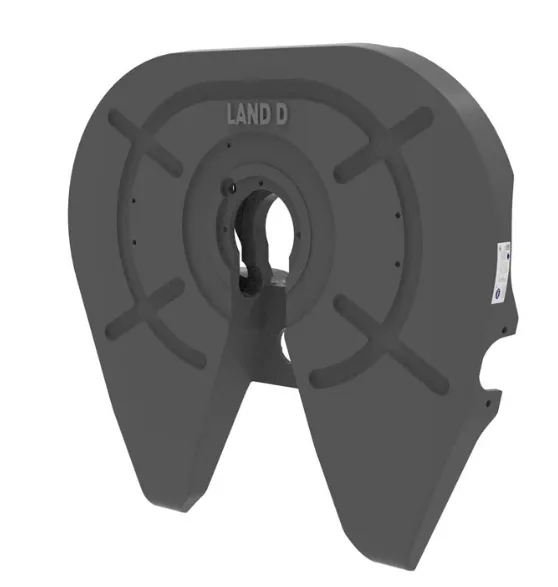Juli . 16, 2025 17:11 Zurück zur Liste
Unveiling the Essentials of Fifth Wheel Systems in Heavy - Haul Transportation
In the realm of commercial trucking and logistics, fifth wheel systems serve as critical interfaces between tractors and trailers, enabling the safe and efficient transport of heavy loads. Key elements such as fifth wheel weight, the capabilities of fifth wheel trucks, the nuances of fifth wheel transportation, and regional considerations like fifth wheel st louis all play pivotal roles in optimizing these systems for diverse applications. Understanding these components is essential for ensuring safety, compliance, and operational efficiency.

The Impact of Fifth Wheel Weight on Vehicle Performance
Der fifth wheel weight is a crucial factor in determining how loads are distributed between the tractor and trailer. This weight refers to the vertical force exerted by the trailer onto the fifth wheel coupling of the tractor. Properly balancing fifth wheel weight is essential for maintaining traction, stability, and braking performance. For example, if the fifth wheel weight is too low, the tractor’s rear wheels may lose grip, leading to reduced control, especially in adverse weather conditions. Conversely, excessive weight can overload the tractor’s axles, violating legal weight limits and increasing wear on components. Manufacturers provide guidelines for optimal fifth wheel weight ranges, which vary based on the tractor’s design and the trailer’s load capacity, ensuring that operators can achieve a balanced setup for safe hauling.
The Design and Utility of Fifth Wheel Trucks
Fifth wheel trucks are specifically engineered to accommodate fifth wheel couplings, making them ideal for hauling semi - trailers. These trucks feature a robust frame and a fifth wheel plate mounted on the bed, which serves as the connection point for the trailer. The design of fifth wheel trucks allows for a higher load capacity compared to other truck types, as the fifth wheel distributes the trailer’s weight across the tractor’s axles. In industries such as construction, agriculture, and logistics, fifth wheel trucks are indispensable for transporting heavy equipment, bulk materials, and large containers. Their ability to handle substantial fifth wheel weight and provide a stable connection ensures that even the most demanding hauls are completed safely and efficiently.
Optimizing Efficiency in Fifth Wheel Transportation
Fifth wheel transportation offers distinct advantages in terms of load stability and maneuverability. The fifth wheel coupling allows for a pivot point that enables the trailer to turn smoothly behind the tractor, reducing the risk of jackknifing. This is particularly important in urban environments or when navigating tight corners. Additionally, the design of fifth wheel systems facilitates quick and easy coupling and uncoupling, streamlining the loading and unloading process in logistics operations. In fifth wheel transportation, proper maintenance of the coupling mechanism, including regular checks on the fifth wheel weight distribution and lubrication of moving parts, is essential to prevent wear and tear and ensure the longevity of the equipment.
Fifth Wheel Solutions in St. Louis: A Regional Perspective
In locations like St. Louis, where logistics and transportation are vital to the economy, fifth wheel st louis services and solutions play a significant role. Local suppliers and maintenance providers offer expertise in fitting, adjusting, and repairing fifth wheel systems for both commercial fleets and individual operators. For instance, companies in St. Louis may specialize in ensuring that fifth wheel trucks operating in the region comply with state and federal weight regulations, helping clients manage fifth wheel weight to avoid penalties and enhance safety. Additionally, these providers may offer customized solutions for transporting goods through St. Louis’ diverse terrain and weather conditions, ensuring that fifth wheel systems perform optimally in local environments.
FAQ: Key Insights into Fifth Wheel Systems
How does fifth wheel weight affect fuel efficiency?
Proper fifth wheel weight distribution is directly linked to fuel efficiency. When the weight is balanced correctly, the tractor’s engine doesn’t have to work harder to maintain traction or overcome instability, reducing fuel consumption. Conversely, an imbalanced fifth wheel weight can increase rolling resistance and engine load, leading to higher fuel costs over time.
What should I consider when choosing a fifth wheel truck?
When selecting a fifth wheel truck, factors such as the maximum fifth wheel weight capacity, tractor horsepower, axle configuration, and compatibility with the trailer’s coupling type are crucial. It’s also important to check for compliance with local and national weight and safety regulations to ensure legal and safe operation.
How often should I inspect the fifth wheel coupling in transportation?
Regular inspections are essential for fifth wheel transportation safety. Inspect the coupling mechanism before each trip for signs of wear, damage, or improper lubrication. Additionally, check the fifth wheel weight distribution and alignment at least once a month or more frequently for high - usage fleets to identify and address issues early.
Are there specific regulations for fifth wheel weight in St. Louis?
Yes, fifth wheel st louis operations must adhere to Missouri state regulations and federal guidelines regarding vehicle weight limits. These regulations specify the maximum allowable weight on each axle, including the weight exerted by the trailer on the fifth wheel. Local providers can assist in ensuring compliance to avoid fines and maintain safety.
Can I adjust the fifth wheel weight on my truck?
Yes, the fifth wheel weight can be adjusted by moving the fifth wheel plate forward or backward on the tractor bed, within the manufacturer’s recommended range. This allows operators to balance the load between the tractor’s axles, optimizing traction and compliance with weight regulations. Always follow the manufacturer’s instructions or consult a professional for adjustments.
-
What Defines Excellence in Fifth Wheel Components and Their Manufacturers?
NachrichtJul.16,2025
-
Unveiling the Essentials of Fifth Wheel Systems in Heavy - Haul Transportation
NachrichtJul.16,2025
-
Unveiling the Essentials of Fifth Wheel Components in Commercial Transport
NachrichtJul.16,2025
-
Unveiling the Essence of Holland 5th Wheel Systems
NachrichtJul.16,2025
-
Unveiling the Dominance and Features of Holland Fifth Wheels
NachrichtJul.16,2025
-
Discovering the Diverse Landscape of Truck - Related Services and Offerings
NachrichtJul.16,2025
